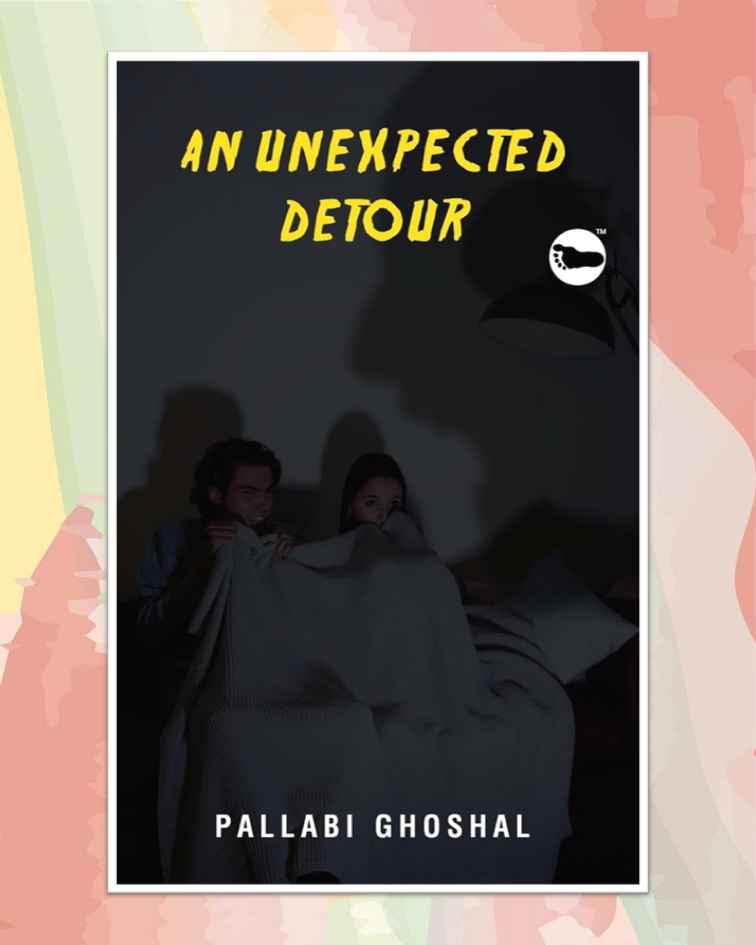Sameer Gudhate presents the Book Review of An Unexpected Detour by Pallabi Ghoshal
- Sameer Gudhate
- Aug 21, 2025
- 4 min read

Imagine booking a honeymoon on a postcard-perfect island — the kind of place where the sky seems freshly painted and the sea whispers promises of forever. Now imagine that same paradise turning into a stage for your worst nightmare. That’s exactly the slippery turn Pallabi Ghoshal takes us on in An Unexpected Detour, and let me tell you, once I started, there was no “just one more chapter.” Sleep had to wait.
This isn’t the first time Ghoshal has tangled with tension — her earlier works have shown she has a knack for peeling back the glossy layers of love to reveal obsession, trauma, and the shadows people try to bury. Here, though, she sharpens her storytelling into something tighter, faster, more breathless. She lures us in with romance and then, without warning, pushes us into the dark corners of human cruelty. It’s unsettling, yes, but also magnetic.
At its core, the story follows Tanmay and Radhika, two newlyweds carried away on a blissful holiday, until they’re dragged — literally — into the grip of a sinister force. The beauty of Ghoshal’s setup is that it’s so ordinary at first. We’ve all seen couples lost in each other’s glow, wrapped in their bubble of new beginnings. That normalcy makes the shift into danger all the more jarring. Suddenly, the clinking of glasses and rustle of palm leaves give way to chains, silence, and the suffocating dread of captivity. You feel their terror, because you’ve been lulled into the same dream.
Ghoshal’s prose is crisp, uncluttered, but laced with enough detail to trap you in the atmosphere. She knows when to linger — on the trembling hands, on the sound of footsteps behind a locked door — and when to sprint, ratcheting up the tension until you realize your own shoulders are tense. It’s a novella, so the pace rarely lets up, but within the rush, she sneaks in moments of emotional resonance that surprised me.
What stood out most to me was the couple themselves. Tanmay and Radhika aren’t just pawns in a thriller — they’re painfully human. They argue, they cling, they doubt each other, and yet their love threads through even the darkest scenes. There’s one moment where Radhika’s quiet resilience cracked me open; it wasn’t about heroics, but about survival, the kind of strength that looks like holding on when everything tells you to let go. It reminded me of how, in life, it’s often the smallest acts — a whispered “we’ll be okay” — that carry us through the storm.
Structurally, the book moves in a linear fashion, but with carefully placed twists that reframe what you thought you knew. Some I saw coming, others blindsided me in the best way. Yes, a few passages before the climax stretched a little longer than necessary, but I also think that disorientation mirrors what the characters are feeling — time dragging, hope fraying, danger pressing in.
Beneath the suspense, the themes ripple through. Vengeance, trauma, the blurred line between victim and aggressor, but also love, hope, and the healing power of therapy. There’s a quiet insistence that even in the worst shadows, people reach for light. And isn’t that something we all know too well these days? Life throws detours — illness, loss, heartbreak — and while we don’t choose them, they shape us. Reading this, I couldn’t help but think of the past few years and how resilience isn’t always about winning battles, but surviving them.
For me, the book’s greatest strengths lie in its relentless pace, its eerie atmosphere, and its willingness to balance horror with heart. The setting — particularly the haunting backdrop of Dhanushkodi — lingers like salt on the tongue. And the open ending? Perfect. It leaves you unsettled, but also strangely hopeful.
If I had one quibble, it’s that I craved a touch more depth in certain character moments. Their bond is central, and while it shines, at times it feels rushed. But that’s the trade-off with a novella: speed over stillness. And truthfully, the speed is what makes it such a page-turner.
Would I recommend it? Absolutely — especially to readers who love psychological thrillers with emotional weight, fans of Gillian Flynn or S.J. Watson. It’s dark, yes, but not gratuitously so. It’s about what happens when paradise crumbles, and how love tries — stubbornly, desperately — to piece it back together.
Closing the book, I sat there in the quiet, thinking about detours. How the very word implies inconvenience, annoyance. And yet, so often, it’s those unexpected turns that take us somewhere truer, deeper, even life-saving. Ghoshal captures that paradox beautifully. An Unexpected Detour isn’t just a thriller; it’s a reminder that sometimes the worst journeys carve out the strongest versions of ourselves.
If I had to pin it down — a solid 4.5 out of 5. And more importantly, a story that will haunt me, in the best way, for a long while.
#BookReview #ThrillerReads #PsychologicalThriller #MustReadBooks #BookstagramIndia #ReadersOfInstagram #FictionLovers #SuspenseBooks #PageTurner #GrippingRead #BookishCommunity #BookObsessed #NovelAddict #DarkThriller #EmotionalReads #WeekendReads #BookRecommendations #ReadersDelight #BooksWorthReading #Unputdownable #sameergudhate #thebookreviewman




Comments